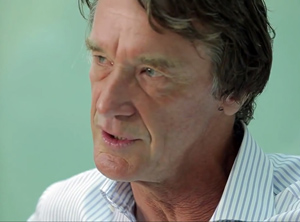INEOS
Lawsuit filed against Sinopec over alleged acrylonitrile patent infringement / Seeking more than USD 1 bn in compensation / Latest quarrel picked by chairman Ratcliffe
 Looking for a fight? Ineos chairman Jim Ratcliffe (Photo: Ineos) |
It seems like Ineos (Rolle / Switzerland; www.ineos.com) chairman Jim Ratcliffe is on the lookout for ever more challenging sparring partners. After a successful brinkmanship strategy at the company’s petrochemical and polyolefins site in Grangemouth / UK last year – when the union ended up blinking before the self-made billionaire (for details, see Plasteurope.com of 11.09.2013) – Ratcliffe most recently took it upon himself to warn European Commission president Jose Manuel Barroso about the creeping demise of Europe’s chemical industry – see Plasteurope.com of 12.03.2014.
Barely a week has passed since his open letter to Barroso and Ratcliffe is in the news once again, with international financial media reporting that Ineos is suing Chinese state-owned petrochemical giant Sinopec (Beijing; www.sinopec.com) over violating intellectual property agreements and misusing trade secrets to build a new acrylonitrile facility in Anqing, Anhui province.
Ineos has filed the relevant lawsuit at the Beijing High Court and is said to be pursuing parallel arbitration in Sweden, seeking more than USD 1 bn in compensation. The Financial Times speculates that the claim might be just an opening gambit, with Ineos’ global acrylonitrile business estimated to be worth USD 3 bn, and the company saying the alleged patent infringement causes “major harm” to its own business. Plasteurope.com’s Polyglobe capacity database (www.polyglobe.net) shows that the Switzerland-based group operates four acrylonitrile plants across the globe – two in the US and one each in Germany and the UK – with total capacity for almost 1.3m t/y.
In a statement dated 21 March, Ineos reportedly said Sinopec was first issued a license to use its acrylonitrile technology in 1984. The fact that the Chinese state-owned conglomerate actually has the right to use the technology could complicate legal proceedings, experts predict. In a response to international media, Sinopec denied all accusations, sayings its subsidiary Shanghai Research Institute of Petrochemical Technology had developed its own acrylonitrile catalyst and technology following 50 years of research, adding that is has full intellectual property rights over the process.
The disputed patent could in fact be similar to the one owned by Ineos, which could complicate proceedings in the Chinese justice system. That notwithstanding, the lawsuit is no shot in the dark either, as the number of copyright violations filed by western companies in the People’s Republic has been on the rise, as China tries to rid itself of its reputation as a haven for patent infringements.
While he is suing one member of the Sinopec family, this does not prevent Ratcliffe from continuing business as usual with another subsidiary of the state-owned mammoth. Last month Ineos and Sinopec Yangzi Petrochemical (Sinopec YPC, Beijing / China; www.sinopec.com) confirmed their phenol and acetone joint venture in Nanjing – for previous coverage, see Plasteurope.com of 01.10.2013.
Barely a week has passed since his open letter to Barroso and Ratcliffe is in the news once again, with international financial media reporting that Ineos is suing Chinese state-owned petrochemical giant Sinopec (Beijing; www.sinopec.com) over violating intellectual property agreements and misusing trade secrets to build a new acrylonitrile facility in Anqing, Anhui province.
Ineos has filed the relevant lawsuit at the Beijing High Court and is said to be pursuing parallel arbitration in Sweden, seeking more than USD 1 bn in compensation. The Financial Times speculates that the claim might be just an opening gambit, with Ineos’ global acrylonitrile business estimated to be worth USD 3 bn, and the company saying the alleged patent infringement causes “major harm” to its own business. Plasteurope.com’s Polyglobe capacity database (www.polyglobe.net) shows that the Switzerland-based group operates four acrylonitrile plants across the globe – two in the US and one each in Germany and the UK – with total capacity for almost 1.3m t/y.
In a statement dated 21 March, Ineos reportedly said Sinopec was first issued a license to use its acrylonitrile technology in 1984. The fact that the Chinese state-owned conglomerate actually has the right to use the technology could complicate legal proceedings, experts predict. In a response to international media, Sinopec denied all accusations, sayings its subsidiary Shanghai Research Institute of Petrochemical Technology had developed its own acrylonitrile catalyst and technology following 50 years of research, adding that is has full intellectual property rights over the process.
The disputed patent could in fact be similar to the one owned by Ineos, which could complicate proceedings in the Chinese justice system. That notwithstanding, the lawsuit is no shot in the dark either, as the number of copyright violations filed by western companies in the People’s Republic has been on the rise, as China tries to rid itself of its reputation as a haven for patent infringements.
While he is suing one member of the Sinopec family, this does not prevent Ratcliffe from continuing business as usual with another subsidiary of the state-owned mammoth. Last month Ineos and Sinopec Yangzi Petrochemical (Sinopec YPC, Beijing / China; www.sinopec.com) confirmed their phenol and acetone joint venture in Nanjing – for previous coverage, see Plasteurope.com of 01.10.2013.
24.03.2014 Plasteurope.com [227858-0]
Published on 24.03.2014

 German version of this article...
German version of this article...